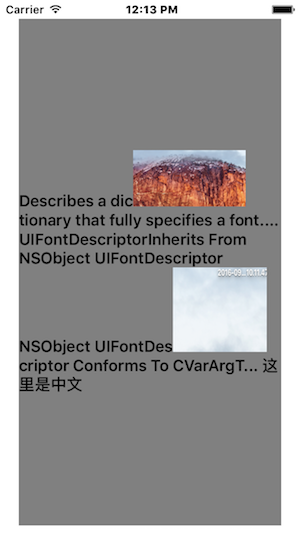iOS文本布局探讨之三——使用TextKit框架进行富文本布局
一、引言
关于图文混排,其实以前的博客已经讨论很多,在实际开发中,经常使用第三方的框架来完成排版的需求,其中RCLabel和RTLabel是两个比较好用的第三方库,他们的实现都是基于UIView的,通过更底层的CoreText相关API来进行图文处理。相关介绍博客地址如下:
iOS中支持HTML标签渲染的MDHTMLLaebl:http://my.oschina.net/u/2340880/blog/703254。
扩展于RCLabel的支持异步加载网络图片的富文本引擎的设计:http://my.oschina.net/u/2340880/blog/499311。
iOS开发封装一个可以响应超链接的label——基于RCLabel的交互扩展:http://my.oschina.net/u/2340880/blog/550194。
二、原生UILabel真的只能渲染文字么?
CoreText是一个比较底层且十分强大的文本渲染框架,但是其使用起来并不是十分方便。在较低版本的iOS系统中,要进行富文本排版十分困难。在iOS6中,系统为UILabel,UITextView等这类文本渲染控件引入了NSAttributedString属性,有了NSAttributedString这个类,创建灵活多彩的文本控件变得十分轻松,开发者只需要配置NSAttributedString属性字符串即可。但是要进行图文混排,依然比较困难。iOS7之后引入TextKit框架,就完美的解决了图文混排这样的问题。
首先,iOS7中新添加了一类NSTextAttachment,从类名理解它是一个文本附件,其实也正是如此,NSTextAttachment类可以向文本中添加一些附件,这有些向邮件系统,寄信者可以向邮件中添加附件一同发送出去。NSTextAttachment类并不直接参与富文本的渲染与布局,渲染和布局依然由NSAttributedString类来完成,NSAttributedString类中提供了方法将NSTextAttachment所描述的内容转换为NSAttributedString示例。以一个简单的图文混排为例:
- (void)viewDidLoad {
[super viewDidLoad];
//进行NSTextAttachment的创建
NSTextAttachment * attach = [[NSTextAttachment alloc]init];
//设置显示的图片
attach.image =[UIImage imageNamed:@"image"];
//设置尺寸
attach.bounds = CGRectMake(0, 0, 120, 60);
NSTextAttachment * attach2 = [[NSTextAttachment alloc]init];
attach2.image =[UIImage imageNamed:@"image2"];
attach2.bounds = CGRectMake(0, 0, 100, 90);
//创建文本NSAttributedString对象
NSMutableAttributedString * attri = [[NSMutableAttributedString alloc]initWithString:@"Describes a dictionary that fully specifies a font.... UIFontDescriptorInherits From NSObject UIFontDescriptor NSObject UIFontDescriptor Conforms To CVarArgT... 这里是中文"];
//将NSTextAttachment映射为NSAttributedString对象
NSMutableAttributedString * att = [[NSMutableAttributedString alloc]initWithAttributedString:[NSAttributedString attributedStringWithAttachment:attach]];
//将图片插入NSAttributedString中
[attri insertAttributedString:att atIndex:15];
[attri insertAttributedString:[NSAttributedString attributedStringWithAttachment:attach2] atIndex:130];
UILabel * label = [[UILabel alloc]initWithFrame:CGRectMake(20, 20, 280, 540)];
label.backgroundColor = [UIColor grayColor];
label.numberOfLines = 0;
label.attributedText = attri;
[self.view addSubview:label];
}
运行工程后,效果如下图所示,其实只使用UILabel也可以实现复杂的富文本和图文混排:

三、为富文本附件添加用户交互能力
TextKit框架强大到只使用UILabel就可以完成复杂的富文本布局,但是UILabel有一个致命的缺陷,其无法进行用户交互。试想,如果可以向一段文本中添加任意数据类型的文件,当用户点击这个文件时,可以获取到文件数据并进行业务逻辑处理,这将十分酷。这样富文本布局其实就不只局限于图文混排了,我们可以插入音频,插入视频,甚至插入任意自定义格式的数据。结合使用NSTextAttachment与UITextView,这些都能实现。先看NSTextAttachment类中的一些常用属性与方法:
//这个初始化方法用于创建携带任意数据的文本附件
- (instancetype)initWithData:(nullable NSData *)contentData ofType:(nullable NSString *)uti NS_DESIGNATED_INITIALIZER NS_AVAILABLE(10_11, 7_0);
//携带的数据内容
@property(nullable, copy, NS_NONATOMIC_IOSONLY) NSData *contents NS_AVAILABLE(10_11, 7_0);
//数据类型
@property(nullable, copy, NS_NONATOMIC_IOSONLY) NSString *fileType NS_AVAILABLE(10_11, 7_0);
//设置渲染的图片 需要注意 如果设置的这个 附件携带的数据 fileWrapper目录内容将无效
@property(nullable, strong, NS_NONATOMIC_IOSONLY) UIImage *image NS_AVAILABLE(10_11, 7_0);
//设置图片渲染的尺寸
@property(NS_NONATOMIC_IOSONLY) CGRect bounds NS_AVAILABLE(10_11, 7_0);
//设置附件携带的文件目录 需要注意 如果设置了这个属性 image和data将无效
@property(nullable, strong, NS_NONATOMIC_IOSONLY) NSFileWrapper *fileWrapper;结合UITextView可以为NSAttributedString属性字符串添加超链接,在代码回调中监听此超链接的回调可以获取NSTextAttachment携带的附件内容,如此就可以自由的进行业务处理了,示例代码如下:
- (void)viewDidLoad {
[super viewDidLoad];
//保留一个数组存放附件
_attArray = [NSMutableArray array];
//创建附件数据
NSData * stringData = [NSData dataWithContentsOfFile:[[NSBundle mainBundle] pathForResource:@"image3" ofType:@"gif"]];
NSTextAttachment * attach = [[NSTextAttachment alloc]initWithData:stringData ofType:@"gif"];
[_attArray addObject:attach];
attach.bounds = CGRectMake(0, 0, 30, 40);
NSMutableAttributedString * attri = [[NSMutableAttributedString alloc]initWithString:@"Describes a dictionary that fully specifies a font.... UIFontDescriptorInherits From NSObject UIFontDescriptor NSObject UIFontDescriptor Conforms To CVarArgT... 这里是中文"];
NSMutableAttributedString * att = [[NSMutableAttributedString alloc]initWithAttributedString:[NSAttributedString attributedStringWithAttachment:attach]];
//为NSTextAttachment转换为的NSAttributedString添加超链接
[att addAttributes:@{NSLinkAttributeName:@"url..."} range:NSMakeRange(0, att.string.length)];
[attri insertAttributedString:att atIndex:15];
UITextView * textView = [[UITextView alloc]initWithFrame:CGRectMake(20, 20, 280, 540)];
textView.backgroundColor = [UIColor grayColor];
textView.dataDetectorTypes = UIDataDetectorTypeLink;
textView.delegate =self;
textView.attributedText = attri;
textView.editable = NO;
[self.view addSubview:textView];
}实现如下的TextView代理方法:
-(BOOL)textView:(UITextView *)textView shouldInteractWithURL:(NSURL *)URL inRange:(NSRange)characterRange{
//可以获取到url 进行匹配
NSLog(@"%@",URL);
//取出NSTextAttachment附件
NSTextAttachment * attach =_attArray.firstObject;
NSLog(@"%@--",attach.contents);
return YES;
}向文本中添加任意数据的NSTextAttachment会展现一个文件的图标,如下图所示:

当用户点击文件图标时,会将携带的gif文件数据进行打印。
专注技术,热爱生活,交流技术,也做朋友。
——珲少 QQ群:203317592
来源:oschina
链接:https://my.oschina.net/u/2340880/blog/745126